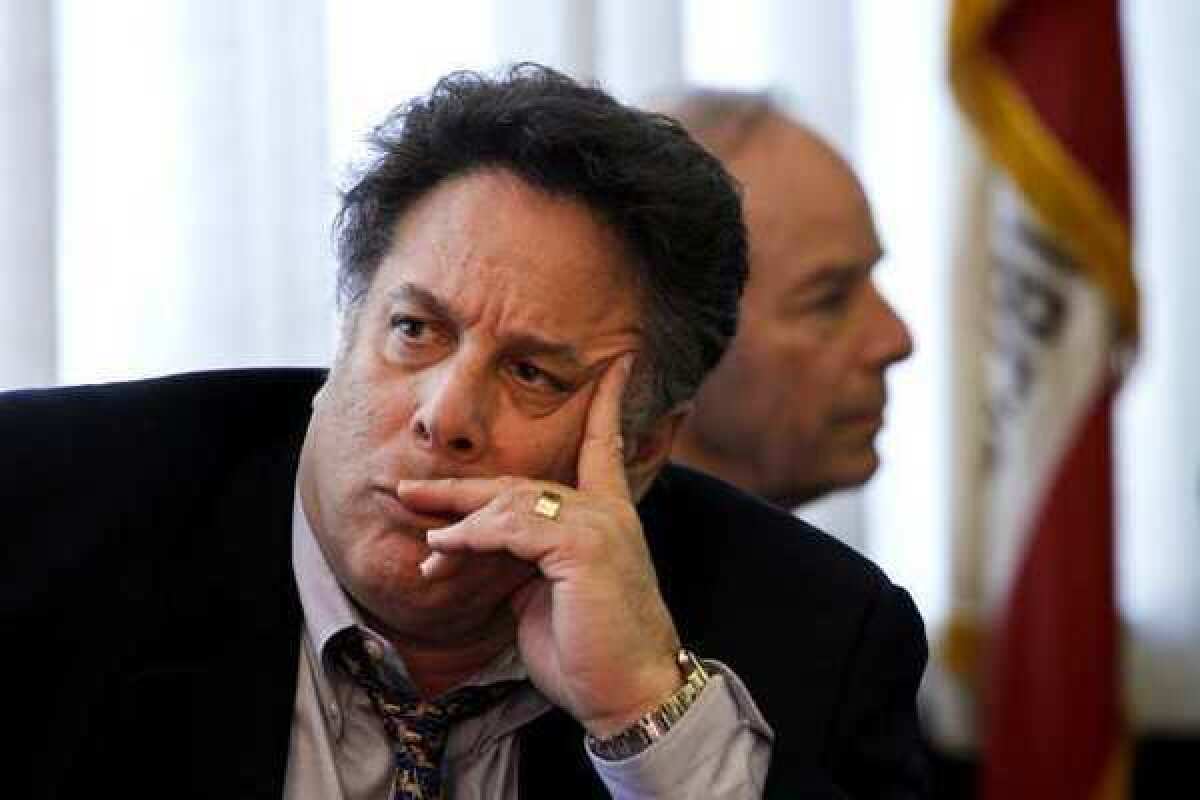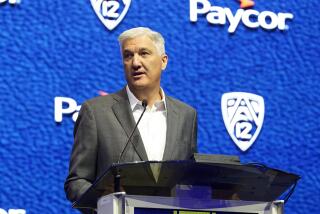President of L.A. Coliseum Commission resigns abruptly

The president of the Los Angeles Memorial Coliseum Commission resigned abruptly Wednesday, saying he quit because his work on a deal to grant USC stewardship of the nearly bankrupt stadium was complete.
David Israel’s departure came as a key state official sharply criticized the commission for its handling of negotiations to turn over operation of the Coliseum to USC and said state representatives should take over all talks on the stadium’s future.
USC would get almost total control of the taxpayer-owned Coliseum and its revenue under the agreement. USC wants control of nearby state-owned parking lots as part of the overall deal.
Robert Stein, who chairs the California Science Center board, the Coliseum’s landlord, said the commission negotiated with USC from a “weak position” because of a financial scandal that racked the stadium complex on Israel’s watch and that of other commissioners.
DOCUMENT: READ ROBERT STEIN’S PREPARED STATEMENT
“The commission is facing insolvency combined with mismanagement, corruption and fraudulent activities,” Stein said. He said the Science Center board should assume the negotiations.
County Supervisor Don Knabe, who became commission president Wednesday, called Stein’s comments “outrageous.” The nine-member commission is made up of representatives of the city, county and state.
Israel was an unexpected no-show at the commission’s monthly meeting Wednesday. He was appointed in 2005 by then-Gov. Arnold Schwarzenegger and remained on the panel after Gov. Jerry Brown opted against replacing him.
His 16 months as president were dominated by the scandal that followed Times reports on financial irregularities at the venue. In March, a county grand jury indicted three former Coliseum managers, a stadium contractor and two prominent concert promoters on a variety of corruption charges.
COLISEUM SCANDAL: FULL COVERAGE
Former General Manager Patrick Lynch has pleaded guilty to conflict of interest, four other defendants have entered not-guilty pleas and the sixth is a fugitive.
Taxpayer advocates have faulted Israel, who also served a yearlong term as president in 2008, and other commissioners for a lack of oversight at the Coliseum and the companion Sports Arena.
The commissioners have also come under fire for granting themselves perks such as free tickets to sporting events and concerts at the stadium complex. Last month, The Times reported that Israel and three fellow commissioners — Supervisor Zev Yaroslavsky, investment banker William Chadwick and City Councilman Tom LaBonge, a panel alternate — used their position to claim a Sports Arena luxury suite for Bruce Springsteen’s recent sold-out stand there.
Israel, a former sportswriter who later worked as a television writer and producer, said in his resignation letter to Brown that he had “long desired to step down” but stayed on to see the commission approve the USC agreement, which he described as an “admirable model of public-private partnership.” He did not respond to an interview request from The Times.
A Brown spokesman said the office had received Israel’s letter and gave no further comment.
Earlier Wednesday, Stein suggested commissioners were eager to grant USC a favorable deal to put the scandal behind them as soon as possible.
“The commission chose politics over governance: ‘Make any deal with USC, get this mess off our desk, off the pages of the L.A. Times and move on so we can begin to campaign for our next elected office,’” Stein said.
Under the 42-year agreement, the private university would pay nothing upfront for the stadium and companion Sports Arena, but would be required to spend about $70 million to improve the Coliseum, where USC plays football. USC would also pick up the roughly $1 million in annual rent the commission pays to the state, which owns the land.
Experts on stadium finances say the arrangement is extraordinary because USC would enjoy ownership-like authority over the Coliseum and receive most of the benefit of the improvements. The agreement allows USC to limit public access to the stadium for non-commercial events, such as community festivals or fireworks shows, to eight days a year.
In defending the deal, commissioners and USC administrators say it would save the 89-year-old Coliseum from financial and physical ruin. School officials also have said the stadium would likely be available for more days of community events than the eight guaranteed in the lease.
The commission approved the lease last month by an 8-1 vote, with City Councilman Bernard C. Parks, whose district includes the Coliseum, dissenting. Before it signs the lease, USC wants to secure the state-owned parking and extend the lease agreement through 2111.
Meanwhile, the commission adopted an annual budget Wednesday that forecasts a negative bank balance of more than $1 million by December. It has lost millions of dollars over the last several years.
Times staff writer Andrew Blankstein contributed to this report.
More to Read
Start your day right
Sign up for Essential California for news, features and recommendations from the L.A. Times and beyond in your inbox six days a week.
You may occasionally receive promotional content from the Los Angeles Times.








